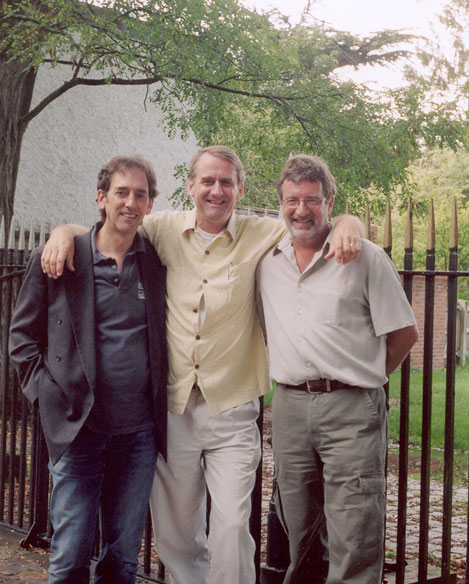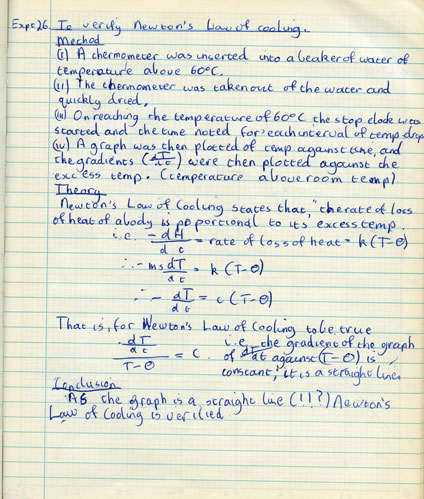
A page from my physics lab notes in 1969, reporting on an experiment to validate Newton’s law of cooling. The graph on the facing page was not a straight line: somehow, we had blown it!
Being back home brought back a more normal focus to a young scholar’s life. I spent the first year and a half preparing for the “O” levels, and did very well in them I was told. All that hard work early on at Solihull had borne fruit. That was it: I was done.
I didn’t deliberately stop studying as hard over the ensuing final two years of school, but gradually did less and less of the homework, telling myself more and more over time that I could catch up later, in time for the “A” Levels. Having spent four years hearing almost exclusively how important the “O” levels were, we were now being told effectively that they meant nothing, really, not for the future, no. Now all that counted was the “A” Levels, the next level of exams.
Completion of the “O” levels also brought up the issue of what we were going to do with our lives. From the eight or nine “O” level subjects, each of us was obliged to choose three or four subjects to pursue for the next two years for “A” levels. There were the arts, the sciences or a combination of the two called “remove.” In many cases the choice was easily made based on the simple preference of the student concerned, expressed through the better “O” level results obtained in his chosen subjects.
My choice was more difficult, as my results were equally good all round. Dad thought that I should become an engineer, a career that he himself had turned away from but which he evidently thought would be good for me. He was more specific: I should become a sales engineer, using my “gift of the gab,” as he put it, to complement my ability in the sciences. As a personnel manager, dad was sensitive to industry’s needs for the various professions, and engineers were much in demand at the time. I also had a discussion with the headmaster, and he too wanted to bring forth tomorrow’s engineers. Fine. I loved maths, and suspected that the sciences would be easier than the arts. Even if the arts interested me more, I had no idea what kind of career they could lead me to.
Fortunately, I respected and admired several of my teachers. Dennis Payton communicated concepts like Newton’s law of cooling in a way that grabbed our attention and was genuinely interesting. Imagine that: calculus could actually be used for something practical! And Enid Langridge, who was one of the few teachers at the school who held a Ph. D., hers in Maths, slogged through years with us louts disappointing her at every turn. I tried to keep it under control for Honey, as she was called. Charles Davenport taught us would-be scientists a kind of remedial English. He was a gentleman, complete with a limp earned on the battlefield and an airman’s moustache. We all loved Davvy.
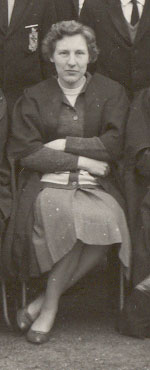
Enid (“Honey”) Langridge, Ph. D. She taught us calculus and the like and helped salvage my future. Taken from the 1967 school photo: poor quality.
What the good teachers could not overcome was the anomie built into an educational system that valued exam results above all else. I did well at exams, very well, and so having as a central goal doing well in exams felt pretty comfortable for years. But I took “O” levels at fifteen, and doing well was no longer enough for me at that age. It still sufficed for the school, but what was it all for? At fifteen, a purpose for the exams was necessary. The only purpose that we had been given for the next set of exams was winning admission to University, and not just whether one was worthy of attending University, but also which University one was worthy enough to attend. At University, guess what, we would have more exams to pass to be able to graduate. That was a brilliant strategy, right? Brilliant for creating anomie.
Here’s John Lennon, looking back on our lives: “When they’ve tortured and scared you for twenty odd years, then they expect you to pick a career, when you can’t really function you’re so full of fear.” (From “Working Class Hero,” written by John Lennon and performed by John Lennon/Plastic Ono Band). Lennon was a tortured soul whose empathy for those like us whom he had never met was equaled only by his peculiar detachment from those he loved. He saw that our education meant nothing at all by the end.
With the benefit of hindsight, even the structure of our education at this age (15 or 16 to 18 or 19) was itself inappropriate. After making the few limited choices available to us, like which subjects to take, we had almost no more right to item or initiative. The classes were all prescribed, meaning very few electives, and the “A” levels themselves took almost all of our class time. The choice of subjects was very limited, omitting basic topics like business, and our available extra-curricular activities were minimal. School sports were about it, with perhaps some classical music and drama. At an age where natural curiosity and initiative can be channeled and developed, we were buried in a required curriculum that combined difficulty with pretty much total irrelevancy to the world around us.
In short, we were being prepared to administer rather than create or produce. Administering any substantial institution requires knowledge and a kind of intense self discipline, the kind that studying the abstract entails. Initiative is misplaced in such institutions: it poses a threat to the established order, which is all important. Unfortunately, the British Empire had been all but dismantled after the War. Twenty years later, English education had not caught up with the country’s revised needs and was still preparing us to administer a non-existent empire. I suspect that the preparation was still very good, as it had been for close to a hundred years, but was not concerned with such niceties.
As the first “A” level year turned into the second, social life was beginning its slow climb from the dregs, gainful employment was taking more time, and fooling around became job one at school. Homework started taking a back seat to activities like the Air Training Corps, with its camaraderie and fun things to do, as did developing more of a social life, which meant above all trying to meet the girls whom we did not meet at school. Money too was becoming more of a focus, as interests out of school developed, and studying for school was losing its allure.
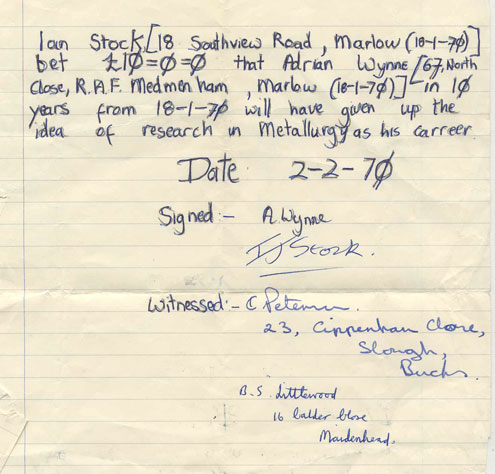
The most difficult photos to locate are of friends during my teenage years. With the exception of the schools’ own photographs, and many of those are inexplicably missing, there were none. No-one brought a camera to capture youth. These missing photos mattered less at junior school, but I’d love to have a few candids of friends in Marlow. In the absence of a photo, this is a bet that I made with Adrian in January of our last year at Borlase’s. Chris Petersen and Bruce Littlewood witnessed it.
Into the vacuum stepped adolescence. Who was it that said “Through no fault of my own, I reached adolescence?” Me too! I embraced it. I ran myself silly playing football almost every break, sweated and panted through the beginning of every class, and still had the energy to act out in class, again and again. I would argue with the teacher, normally intellectually but there was a tendency for the arguments to degenerate into something approaching mockery. Because I had done well on the “O” levels, and was thus looked on as a feather in the school’s cap, I got away with a lot.
It was unfair, really, to other boys who had been less successful in exams, not necessarily less bright, but whose caprices and acting out were thus less tolerated by an administration eager for academic success on the part of their young charges. I was able to embrace adolescence and get away with it, while many others had to fight against it in order to get anything out of school.
Coincidentally, Adrian Wynne arrived at the school right after the “O” levels. Parents identify a particular friend of their child whom they tend to blame for whatever goes wrong with the child. It can’t be the parents, after all! Adrian became that friend for me. He was a military brat, his father a career RAF engineer, and his family had moved around even more than my family. Their most recent move was to RAF Medmenham, the signals base on the Henley road outside of Marlow, and Adrian was duly dispatched to Borlase’s. He was one of the first in my year to grow his hair, and had impressive access to what was erupting in rock’n’roll, not forgetting the milder illicit substances. Perhaps mum and dad suspected his role in the latter, but I had been a regular fixture at smoker’s corner behind the school for a while before Adrian arrived. And let’s face it: mum and dad smoked like chimneys until their respective ends.
Adrian and I inspired what was my most regrettable (or laudable, depending on your point of view) moment of acting out in class, which had the added benefit of prompting a reduction in my course load. It all started when we discovered that when connected to the high pressure water tap, a Bunsen burner had a lot more going for it than when it was connected to the gas tap. Some design genius had built both the taps almost the same size in our lab, and there were sinks in front of each pair of stools. Water forcing its way through a Bunsen burner spat out in a line that was more or less dead straight for about 30 feet. Maybe longer. And fast, whap! The science of the effect was not difficult. The water was under pressure, just in case it was needed in an emergency, and accelerated its way easily through the very small hole for the gas in the Bunsen burner.
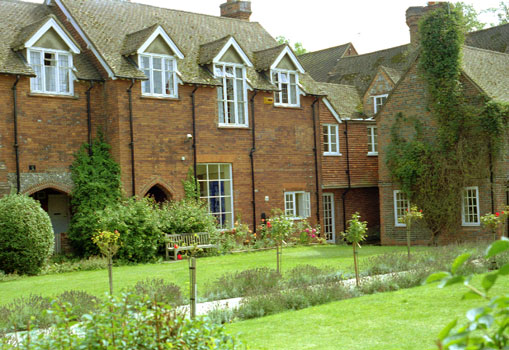
This charming spot is the old quadrangle at Borlase’s. I took the photo in 2004, but it looked exactly the same in the late 60s in my memory.
It did not take long for this discovery to become a monster, perhaps a couple of hours in class, testing, exploring, making sure that the first success wasn’t just a lucky fluke. Then we got serious. This was not discussed, of course, or in any way planned. This was adolescence finding its expression, in much the same way that water finds its way through the weakest point in the dyke.
What had started as a peripheral amusement took over the class a couple of days later. Adrian and I were seated in the back row, of course, at opposite ends from each other. We began to spray large portions of the class while old Foxy had his back to us and was writing on the blackboard. Then, of course, somebody sprayed the blackboard as the already-sprayed boys in the forward rows began to join in the fun. Notice how this story has that same inevitability about it as a man reading a newspaper walking along a sidewalk with a manhole in front of him in a silent movie? You just know what is going to happen, and it did.
I do not remember or understand to this day why I sprayed Foxy himself when he turned around to continue the class. He was obligingly short-sighted, and class would have continued with him continuing the lesson as if nothing had happened, which was his normal approach to misbehavior of this ilk. He had certainly seen the water splashing around where he wrote on the blackboard, but he would have ignored it. Right away, I got him full in the face. Marvelous things, Bunsen burners! I swear to this day that it had not crossed my mind before splashing his spectacles on that first burst that without them he would be effectively as blind as a bat. It was not planned. I promise, honestly. Once we saw that Foxy was visually incapacitated, well adolescent boys are not the most kind when faced with authority’s achilles heel. We drenched him, head to foot. Class was dismissed early.
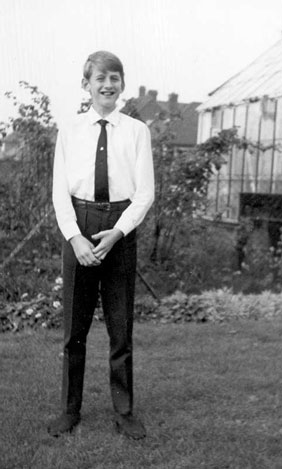
In my Borlase’s uniform, less the blazer, in the back garden at 18 South View Road in 1967. The uniform of white shirt and black tie was creatively adjusted as we advanced through the years. We exchanged more colorful ties, or dropped them completely, and the shirts too started to show some color.
As was I. In fact, this is my sole confirmation that my memory of having been some sort of an instigator was accurate. The headmaster, Mr. Ernest Hazelton, bespectacled, suitably grey-haired, we called him the Monk because he looked like what we thought a monk would look like, called me into his office, and advised me that I had gone a bit too far and that he had been obliged to promise his chemistry teacher that I would be appropriately sanctioned. Nowadays, we would be talking suspension from school if not expulsion. Back then, his tone was almost jovial and the appropriate sanction was that I was expelled from chemistry. He conveyed that he understood how these things happened, but I had better be careful because I could get into a good University with three “A” Levels but not with two alone. So it was time to shape up, or at least not let it go so completely.
I was lucky, and the Monk’s talk must have done something for me, because that was the closest I ever got to expulsion. Busy earning money or playing, or just being young, I was barely trying for the last year or so. But I did keep it up, doing homework once in a while, not taking off too many days without permission. It was something of an endurance test, but I still wanted so much to please mum and dad that there really was no doubt that I would do enough. They were being very kind to me, and nothing motivates an adolescent like real kindness.
I like to think that it was the anomie during my “A” level years that caused me to miss a real opportunity that snuck into the curriculum when I wasn’t looking. If it wasn’t the anomie, I simply blew it. Borlase’s made an arrangement with Imperial College, a part of London University, to use the latter’s IBM mainframe computer for the benefit of Borlase’s pupils. We were to punch holes in the supplied punch cards with attempts at simple instructions. This was basic programming, in Fortran. The school then posted the cards to Imperial, which duly ran them through their mainframe computer and returned the results to the school, again by post. I skipped this class too at some point before completing it, probably to play pinball in the West Street Café or work at the White Swan. The logic at the time was that it was not required and thus I could let it drop with relative impunity. Dropping that unusually creative class is one of those big “what ifs?” of my secondary education.
There was a great deal of more or less stupid humor at school. My reserves while boarding about scatological humor and coarse humor had largely dissipated. Of course, I don’t remember much of it, just the laughter. Smoking brought a couple of standards. “Got a match?” “Your face and my ass!” “Got a match?” “Your breath and a buffalo fart!” The single biggest laugh of those years was a copy of a letter reputedly written by an Australian in response to a government demand for taxes or something similar. His summary of the unbearable string of bad luck that had befallen him was hysterical. At boarding school, I would not have found it funny. Not two years later, I laughed until my stomach hurt. Only his last plaintiff words to the government have stuck: “may the bluebird of happiness shit on your head!”

David Milsom, looking dapper in the falling snow, with Neil Ackerman behind him in Galtur. David found this photo in 2008. Neil played rugby for England, in the under 15s, I think.
My class at Borlase’s was mild in its disobedience compared to some of those that followed us. Adrian’s brother Gerald was about two years younger, and his class earned a certain notoriety by destroying all the furniture in their classroom. That seemed a little excessive, but was only a degree or so worse than us. The curriculum of both our years was still composed almost entirely of the three “R”s, and was indeed extremely annoying. There was little relevant to any career, and even less relevant to what was of interest to us adolescents. My generation expressed more clearly than the school wanted how we felt in school and about school, and in consequence took the first steps in changing at least curricular irrelevance for subsequent generations. John Lennon, who gave new meaning to the word clever, explained that destroyed classroom another way: “They hurt you at home and they hit you at school, They hate you if you’re clever and they despise a fool, Till you’re so fucking crazy you can’t follow their rules. . . ” (from “Working Class Hero,” written by John Lennon and performed by John Lennon/Plastic Ono Band).
Meaning at Borlase’s then, what the school was all about for us disgruntled adolescents, came down to the school’s unofficial song, known as “BTEH” and sung with gusto and unbridled enthusiasm on the way to rugby matches or on field trips, or simply walking along the corridors: “Balls to Ernest Hazelton, Hazelton, Hazelton, Balls to Ernest Hazelton, Balls to the Monk. He keeps us waiting while he’s masturbating. Balls to Ernest Hazelton, Balls to the Monk.” I couldn’t carry a tune but I could bellow that. We all could, and we all did.
Borlase’s was first and foremost a daily grind, as schools and jobs are as a rule, with highlights like the fifth form football game thrown in. During the spring of 1969, there was another real highlight, the school ski trip, the only one that I went on. We took the train to Galtur in the Austrian Tyrol, and needless to say we brought back more than a few memories. My first was on the train ride out. We were at a station somewhere in Germany, fooling around in the compartment that a group of us shared. For no real reason, I threw a glass of water out of the window and it landed on a middle-aged man standing and minding his own business on the platform. I don’t know if I actually aimed it at him, or just threw it wildly out of the window. He was visibly shocked and quite wet. Every boy in the compartment roared with laughter. My laughter was a little strained: I felt embarrassed and more than a little nervous: what if the wet gentleman came onto the train to identify or denounce the culprit? Why did I do that anyway? What was the point? I had no answers at the time, although it must have been an adolescent kind of showing off. The wet gentleman limited his response to glaring at the train, apparently unable to discern from which compartment the water had been thrown, and at least publicly I relaxed and joined in the ribald laughter in the compartment.
Never having skied, I had a lot to learn. For the first couple of days, we in the beginners’ class, perhaps half of the Borlase’s group, learned how to snow plough to change direction and stop. The first key thing to learn was how to stop. I was amazed at how fast skiing downhill was if you let yourself go or if you couldn’t slow down, even on the short distances of the beginners’ slopes we were learning on. Every tiny downhill was a rush, broken only by the slogging back up. Skiing had the makings of being a great sport. The evenings were spent looking for beer and girls, not necessarily in that order. Chasing after girls felt less doomed to failure than in Marlow, because we could actually feel that here on holiday the girls were even looking for us with a little more in the way of interest. We knew none of them, and so there were no possible preconceptions. What with the downhill rush during the day and the possibilities around the village during the evening, I was going to enjoy this!
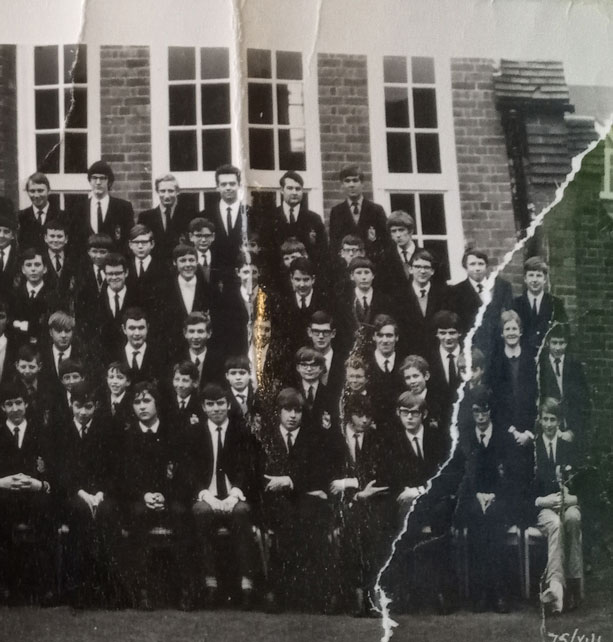
My ski trip injury, as immortalized in the 1969 school photo. I’m sitting bottom right with plaster on my right leg. Others I recognize 50 years on include Chris Hall, Dave Ginman, Godfrey Morrison and Bruce Littlewood. David Milsom located this photo, a little the worse for wear.
In stepped youthful hubris, as it does when you’re young. David and Andrew Milsom had skied before, on at least two or three earlier school ski holidays, and were in different classes from the beginners’ class that I was in. After we had all been there a few days, during an afternoon when there were no classes, they invited me to join them skiing down one of the main runs above the village. It was a beautiful day, and I calculated that as I already knew how to stop, that had to be enough. So off we all went, up the long chairlift and above the tree line. It was so beautiful on those first top slopes as we began our descent, the sun glaring on the snow-clad Alps, the trees so dark below the tree line. Yes, it was harder to stay upright and make safe progress than on the beginners’ slopes, but it was glorious all around and snow ploughing worked as well as on those slopes, if a little more slowly as my speed increased. Despite skiing steadily faster so as not to ruin their descent, I was delaying the other boys, who were courteous enough to stop and wait for me a couple of times.
Then clouds fell on us out of nowhere. I swear that I barely saw them coming before we were skiing through them and visibility dropped to about 40 or 50 yards. I lost sight of the other boys ahead of me almost immediately, and that threw into relief a difficulty that had gone unremarked in the bright sunlight: how to follow the run we were on. I began to feel very nervous, which is probably not a good idea on skis. The mountain seemed to fall away into the fog, and I snow ploughed for dear life, just to slow down and turn where I thought that the run turned. I was all alone, bouncing over a series of bumps, skis attempting to hold a snow plough and turn, when the tip of a ski stuck in one of the bumps and the ski stopped suddenly. I crashed hard. The binding connecting one of my skis to the boot came off late. My leg hurt as I lay there on the packed snow, but not too much until I tried to stand on it. I sat right back down in the snow, and started trying to figure out how I was going to go down the rest of the way when I couldn’t stand, let alone ski. I sat and lay there, occasionally trying to find some way to put weight on my foot, perhaps holding it at a particular angle, as if in some magic way it could fix itself with a little effort. The minutes ticked by, and I began to wonder if I had succeeded in staying on the run, thus assuring that I would soon be found.

In this extract from the 1967 school photo, Ernest (the Monk) Hazelton and Charles (Davvy) Davenport. Davvy was wounded during the war and walked with a stick. Both men helped me more than they knew.
It seemed like a long wait before another skier came by and politely enquired in German after my wellbeing. I tried to stand up again, and each attempt hurt more. He motioned me to stay seated, and that he would send help. I had no idea what he meant, but felt reassured and settled down to wait. The clouds became intermittent, increasing my field of vision both up and down the slope. I saw that I was little off to the side, explaining the wait until someone skied by, but still on the main run. By the time the ski patrol arrived, it was almost clear again. The two skiers in the patrol laid me down on the stretcher that that they pushed and pulled between them, and we all zoomed off down the run. On occasion, we were all sliding so fast that braking the stretcher took all of their joint skill and strength. The snow and ice flew up all around me on the stretcher as their skis cut into the surface to steer and brake. Wow! What a feeling! It was almost worth the ensuing pain.
Someone took me to see the local doctor, who confirmed a “kleine fracture,” or crack, in my right tibia. I would not be doing any more skiing this trip, and spent the remainder of the days in the Austrian Alps in bed with my leg in a cast eating excessive quantities of Suchard “Milka” chocolate. 500 gram bars were available and so good. Perhaps I joined in a little during the evenings, but my leg hurt a lot and I was pretty fed up with missing so much of the daytime fun. Here is another of my life’s themes: a brief shining moment, stolen almost, certainly reckless, followed by a prolonged period of misery and regret.
The three and a half years at Borlase’s followed the hurt and numbness of the year boarding. There are not a lot of clues to how I evolved emotionally there. I was more aware of how I was evolving around girls than in normal life at school. But there are some indications. I only remember a few intellectual experiences in class. My favorite was a young English teacher, whose name I have embarrassingly forgotten, showing us the subtleties of Marc Antony’s speech at Julius Caesar’s funeral in the Shakespeare play. Boy was that stuff hard to read! All those words that no-one had ever seen before, all those verses that didn’t rhyme, all that flowery stuff that sounded good but didn’t seem to mean anything. I was 15 at this point, and still read what I was told to read, but reading Julius Caesar was like standing outside a great party and looking in. We knew it was a great party because the whole world admired Shakespeare hundreds of years after he wrote, but we had almost no access at all.

Borlase’s taken from West Street looking east in 1970 by Ronald Goodearl. Shelley’s Cottage is one of those on the far right. We didn’t know or care.
Until that English teacher went through that speech phrase for phrase, and showed us Marc Antony attacking Brutus as he ostensibly praised his dead friend. “I come to bury Caesar not to praise him.” “Was that true?” asked the teacher. “Well if he said so. . .,” I thought. So he explained how Marc Antony was manipulating the crowd, turning them against Brutus while seeming to back him up. Wow! As soon as it was explained, as soon as the meaning was drawn out of those simple but exquisite phrases, I got it. In one class, Shakespeare became worth attempting to read and understand, and the possibilities of political manipulation through oratory became clear. Not bad for one class. But the possibilities it portended came to nothing. Within the year, I had been obliged to abandon English in order to continue to pursue maths and physics. That’s the clue as to how I was evolving emotionally.
Another clue was that I started smoking cigarettes. The first left me lying down too nauseous to stand on the school’s main rugby field. It was after school one day, and I think that it was Gez Kahan who gave me that first sorry smoke. The nausea didn’t stop me coming back for more, of course, and by the time I was 16 I smoked regularly, even at home. I was supposed to buy my own, but mum and dad found it hard to set more stringent limits as they both smoked like chimneys and everywhere they were. If I couldn’t afford to buy, I could always bum off mum. I vaguely resented the ease with which they let me make myself feel sick and damage my lungs. But socially at school, smoking was it. A group of us trooped up the footpath behind the school regularly and more or less indiscreetly to smoker’s corner, above the tennis court where the path turned to climb straight up the hillside. I remember David Milsom, Phil Slow, Gez Kahan, and Scott Purser up there most of the time I was up there. We also smoked at the West Street café in the last two years, spending our lunch money on playing their ancient pinball machines and buying yet more cigarettes.
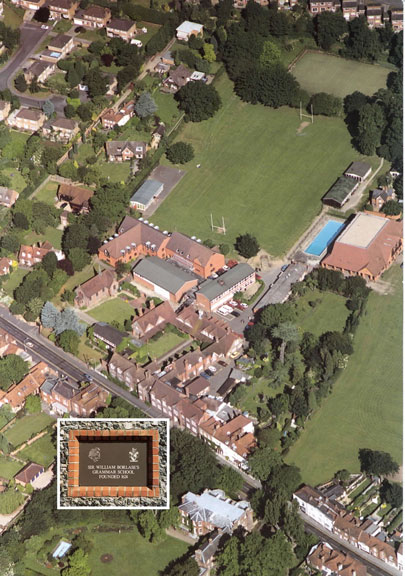
An aerial view of Borlase’s, dating from around 1990. New buildings (by the rugby posts) filled the playground where we played football. The plaque is embedded in the front wall.
What kind of clue as to my emotional evolution is smoking? A little oblique, like dropping the subject which was becoming the most interesting in favor of those deemed the most likely to succeed. My intellectual development, in fast forward mode because of the relatively fast pace of English academic education at secondary level, was being increasingly separated from its emotional core. Without realizing it, intellect was becoming detached from emotion. The disjunction that this produced was anesthetized by smoking and emotional blockages. Looking back, smoking itself served as a kind of emotional blockage.
The third clue is a direct if suspect reference to this blockage. Adrian wrote down a few words one day and gave me the slip of paper with them on. He made a scene out of it, first concealing the words after he wrote them, and then revealing them in a staged flash. He had a tendency to stage, which makes this clue suspect. He could have just identified a vulnerable spot and fired a shot at it, but I thought upon reflection that he was trying to help me realize who I was. He didn’t know that for most of my life until boarding a couple of years earlier I’d been an emotional maelstrom, with the Irish blood coursing through my veins keeping the English intellect in its place. I didn’t quite know yet that this had changed while boarding. He wrote, on three lines, “Cool, So Cool, Cold as Death.” Ouch. He was saying that I lacked heart, that I was so busy being cool that the heart did not show through any more. I was very hurt, and argued against his point of view for months in one way or another. But underneath it all, I had to concede ultimately that he was right in this case. Not always, of course. We were friends. My emotions withdrew into themselves after boarding, leaving an intellect most visible to the rest of the world, an intellect that sparkled still, but without its previous emotional balance. I could be cool, but that was about all. Where had they gone, those teeming emotions that burst out of me all the time?
Borlase’s was a daily grind with highlights, intellectual anomie, girls notable only by their absence and a vulgar school song. It was a really lucky break for me to run across a Headmaster as insightful as Ernest Hazelton after the disaster of boarding. For us day boys at least, he and his long-suffering teachers knew when to give a little instead of imposing the pseudo-military discipline that was still in vogue. They kept me for one on some sort of track, and I would guess that his style helped many others of his charges in that time of accelerated social change. It wasn’t about meaning or ultimate value, but so what? I ended up with good grades in three “A” levels, confirming that I did study enough those last two years to gain admission to a decent University. I failed two “S” levels, suggesting that doing less schoolwork was nonetheless having an impact.
© Ian J. Stock
Next chapter: Chapter 19 “Working on the Night Moves”
Previous chapter: Chapter 17 “Gee but it’s Great to be Back Home!”


